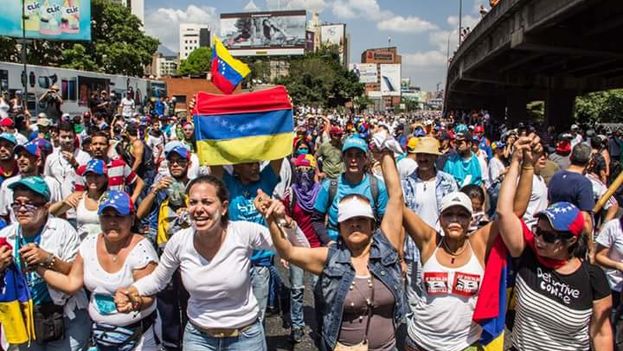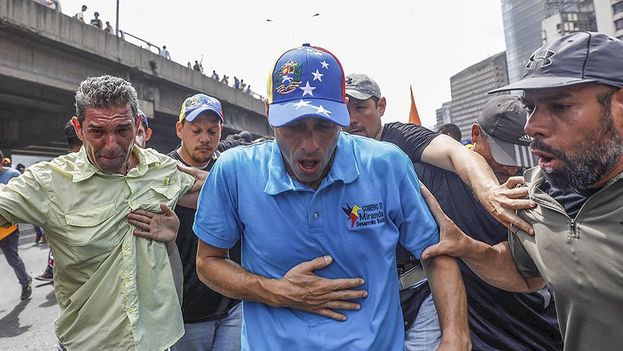
![]() 14ymedio, Naky Soto (Vertice News), Caracas, 15 April 2017 — In spite of having previously asserted that they would call him a dictator and that would not matter to him, Nicolas Maduro did not put up with two days of national and international denunciations of Venezuela’s constitutional rupture demanding a reversal of the Constitutional Chamber’s sentences which stripped the National Assembly of its powers: With a diligent but incomplete National Defense Counsel, at midnight on Friday he announced that the problem was solved. The newspeak did not help this time because minimizing as an “impasse” the State’s blow to legislative power did not change the perception about the substance: In Venezuela there is no democracy.
14ymedio, Naky Soto (Vertice News), Caracas, 15 April 2017 — In spite of having previously asserted that they would call him a dictator and that would not matter to him, Nicolas Maduro did not put up with two days of national and international denunciations of Venezuela’s constitutional rupture demanding a reversal of the Constitutional Chamber’s sentences which stripped the National Assembly of its powers: With a diligent but incomplete National Defense Counsel, at midnight on Friday he announced that the problem was solved. The newspeak did not help this time because minimizing as an “impasse” the State’s blow to legislative power did not change the perception about the substance: In Venezuela there is no democracy.
Chavism repeated its protocol against the opposing marches, blocking access to Caracas, closing Metro stations, and surrounding the Libertador municipality. This last effort has a symbolic as well as strategic value, since the opposition has no opportunity to approach government headquarters and the opposition is still understood as a matter of eastern Caracas. The display by officials during the demonstrations has been disproportionate, in response not to its duty to maintain public order but to the need to violate, with total impunity, the right to protest, discouraging attendance and causing those who have not protested to question its relevance. continue reading
Authorities from the National Bolivarian Police and the National Guard have declared themselves Chavistas, and in consequence, their action responds to partisan interests before security needs. They are neither impartial nor honest, but they also decided to abort any lesson about the progressive use of force and to uproot each street action as if they confronted enemies instead of citizens, fulfilling the order of the vice-president from PSUV (United Socialist Party of Venezuela), Diosdado Cabello, who also has compulsively cited Simon Bolivar’s decree of war to the death, the punishments that traitors deserve and the conviction that not even with blood can power change in Venezuela. It is the discourse of a sociopath, not a leader.
Chavista paramilitary groups, like good mercenaries, no longer have the same incentives to help the PSUV, therefore their presence has been modest compared with other waves of protest. Known by the euphemism of “collectives,” they have come back but without a strategy; they harass a while, fire some shots, steal from whomever they can – with the notable non-response from the security forces – and return to their caves. The declines in the GNP and GDP must now be the most important cause for re-activating the production of tear gas bombs by CAVIM, those that do not even display their date of production much less their expiration date.
We citizens have recovered, after battles, hundreds of shells of various types, Brazilian and local, with dye and expired, in cartridges of plastic and metal. The water cannons (popularly called “whales” and seen in action here) are practically an irony on the street, because in most areas where they have been used, water service is restricted to schedules that have been kept for more than a year. They have added pepper spray to their resources, with generous spraying of protesters. Evidence abounds of the lack of their control, but for Chavism it suffices to say that all that they have done is to preserve the peace, just as breaking the country is justified with their new non-rentier model.
What the officials have executed does not correspond with dissuasion but with ending the demonstrations. The tear gas, pepper spray and the high-pressure water cannons, only weaken the denial of the right to protest and to appear at government headquarters to demand your rights, besides wanting a specific scenario for the resolution of the conflict.
One key official like the Public Defender, Tarek William Saab, has had the chance to approach any of the demonstrations and face the popular demand: that the Republican Moral Council call out the serious offense committed by the magistrates of the Supreme Court. But he has refused: Thus more than 100 human rights organization have demanded his resignation. His action is a confirmation for the rest of the world that in Venezuela there is a dictatorship and there are no institutions, that is why those responsible for a crime of such scale do not appear in court, because by crossing out a couple of paragraphs of their last rulings, responding to an Executive order, constitutional order was restored.
The Minister of the Interior, Justice and Peace, Nestor Reverol, has asserted that those responsible for the violence will be brought to justice, but that does not include his officials who, in demonstrations on Saturday, were capable of launching tear gas bombs inside of shopping centers, residential buildings and even fire stations.
The Chavista propaganda system has used the basic strategy of denouncing what they do. That is why they have carried out their own demonstrations denouncing coups, bombings and invasions, while they celebrate the coup against the National Assembly, poison the citizenry with tear gas and assume powers that do not belong to them.
Nicolas Maduro has broken the economy to the point of driving the country into a severe humanitarian crisis, with excessive inflation, shortages of everything and a prolonged recession and, nevertheless, the president questions the aggressiveness of the recent demonstrations, ignoring the boundary marked by hunger and ignoring desperation as a driving force. The most repeated lie of Chavism is that the protests must have permission, a local version of their argument before the Organization of American States (OAS): In order to speak of the atrocities that a country’s government commits, that government must agree. What he tries to do here is, in order to protest, you need the authorization of those who give rise to your protest.
The Chavista war parties justify state violence, impose criminal charges on some of the demonstrators, have started hate campaigns against others on social networks – including the account of the scientific police CICPC which posts photographs of people who protest – but they also confess that we opponents are “cannon fodder that throws itself” against the cannons that they fire and the ambushes that they despicably carry out. Chavism only promises more repression, Kalashnikov omens for defending the country – Freddy Bernal, official and former mayor, said it – and the admission that “the fart is lit,” in accord with the reading of the advice that the minister and ex-vice president Aristobulo Isturiz gave several times. Violence, the only terrain they have left.
The mass effect is always overwhelming, and it increases with tear gas. That the majority of opposition leaders are choking with the citizens, that they have avoided some arbitrary arrests and managed to meet in the street in spite of their severe ideological difference is an achievement in itself, a reconciliation with the civic cause
Dozens have been wounded by trauma, contusions, pellet impacts, asphyxia and second- and third-degree burns, but indignation has increased, too, hence the need to disperse the protesters faster; the epic resistance is terrible for a dictatorship with such weaknesses, such little – and fragile – international support, and monitoring – expressed in communiqués – by the nations most committed to the democratic cause.

State malice grows, but the reasons and the commitment of the protesters grow also, especially with the media’s level of self-censorship, which has hidden the repression, making itself complicit in some of the crimes that it does not enjoin. The number of arrests of protesters exceeds 100 because it is not enough for Chavism to deny fundamental liberties, but it also needs the management of its version, where repression is peace, the demonstrators are terrorists, the opposition leaders are homosexuals – a simile for cowardice under their criteria – and its violence is more legitimate than the vote.
“I ask you to hold gubernatorial and mayoral elections in order to defeat them at once,” said Nicolas Maduro with a Virgin on his right and a Christ on his left. Three days of protest were enough so that, before leaving for Havana to meet with the representatives of the only international organization that could approve his designs, he reiterated his condition for dialogue and his desire to vote.
Minutes later he affirmed that the legislative elections of 2015 were rigged, that voting for an option other than Chavism equates with treason and that treason is unpardonable for a son of Hugo Chavez, who must defend the homeland before well-being, hunger does not matter but dignity and sovereignty do. Maduro wants elections and releases his first ad for 2018, specifying that there must be regional elections, an efficient scenario to begin to divide the opposition leadership and the people themselves who quickly responded to his proposal, separating themselves into those who demand all or nothing and those who prefer to take it one step at a time.
Even with these conditions, the opposition would crush it on a national level; Chavism knows it, and that’s why Maduro launches the offer and leaves, hoping for the right effect.
The protests continue. The fervor in the streets is distinct, the spirit of the resistance – even suffocated – shows itself in the time of exposure to repression. Most hope that the opposition council transcends the street and puts together a pact capable of uniting the country as much as possible, the new project, that differences feed the diversity necessary for a new republic, concentrated on the rescue of its institutions and the re-establishment of peace.
